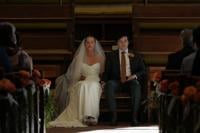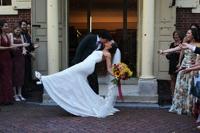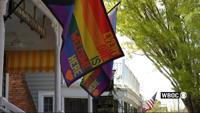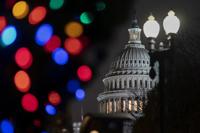Vice President JD Vance’s recent comments about hoping his Hindu wife converts to Christianity have sparked discussions about interfaith marriages. Speaking at a Turning Point USA event, Vance shared how he and his wife, Usha, navigate their religious differences while raising their children Catholic. A Pew Research survey shows that interfaith marriages have increased significantly since 2010. Experts who routinely counsel interfaith couples emphasize the importance of respecting each other's beliefs without coercion. The Hindu American Foundation criticized Vance's remarks, highlighting recent anti-Hindu hate coming from “explicitly Christian sources.”
DELAWARE, Ohio (AP) — Nine couples got married Friday inside a former county jail in central Ohio that was decorated for Halloween.
This photo taken from video shows Judge David Hejmanowski, back left, officiating the wedding of Andrea Bates, center, and Jessica Scales at the Historic Jail and Sheriff's Residence on Friday, Oct. 31, 2025, in Delaware, Ohio. (AP Photo/Patrick Aftoora-Orsagos)
Emily Philbrook and Benjamin Barger hold a moment of silence during their traditional Quaker wedding at Arch Street Meeting House in Philadelphia on Oct. 3, 2025. (AP Photo/Luis Andres Henao)
Benjamin Barger and Emily Philbrook kiss as they walk out of Arch Street Meeting House after their traditional Quaker wedding in Old City Philadelphia on Oct. 3, 2025. (AP Photo/Luis Andres Henao)
Light shines onto a 19th century wooden pew in the West Room of the Arch Street Meeting House in Philadelphia after a traditional Quaker wedding on Oct. 3, 2025. (AP Photo/Luis Andres Henao)
Some Delaware lawmakers are proposing an amendment to the state's constitution. The amendment, if passed, would codify the 'right to marry' as…
The Virginia Senate has passed a marriage equality bill aimed at cementing same-sex marriage in the Commonwealth, sending it on to Governor Youngkin’s final consideration.
The House gave final approval Thursday to legislation protecting same-sex marriages, a monumental step in a decadeslong battle for nationwide recognition of those unions that reflects a stark turnaround in societal attitudes.


















